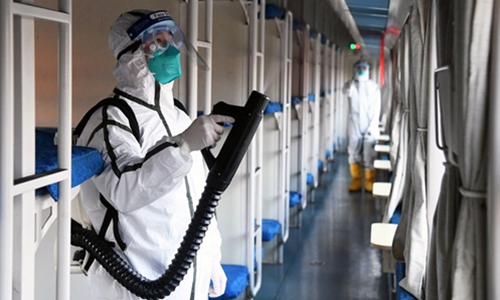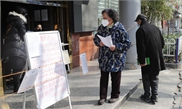China gets tough on imported coronavirus and hiding of travel history, including waiving of free treatment

Staff members disinfect facilities on the train K5227 which runs from Beijing West Railway Station to Qinghecheng Railway Station of Xingtai, north China's Hebei Province, January 30, 2020. Photo: Xinhua
China is taking a zero tolerance stance toward imported coronavirus cases and hiding of travel history, including waiving of free treatment, following a number of new confirmed cases from abroad which are under investigation.
At least 12 coronavirus cases imported from overseas were filed and investigated for suspicion of obstructing border health and quarantine, and impairing prevention and treatment of infectious diseases, Shanghai-based news site thepaper.cn reported.
A man, surnamed Ding, from Northwest China's Ningxia Hui Autonomous Region is the first imported case confirmed in the region. Ding arrived in Shanghai in late February from Tehran, Iran via Moscow and three Chinese cities, Shanghai, Lanzhou and Zhongwei. He was filed for impairing the prevention and treatment of coronavirus on Saturday.
In early March, a man surnamed Guo from Zhengzhou, Central China's Henan Province, was held by police for hiding his overseas travel history.
Guo failed to follow the rules of quarantine and observation, and was found taking public transportation many times to go to his office while he was sick, causing the risk of transmission of COVID-19 in Zhengzhou. Guo's father later apologized to the public on social media.
Six people in East China's Zhejiang Province and four in Beijing who returned from Italy were all filed and investigated this month for not reporting or registering their real health conditions to customs authorities, which have violated the Criminal Law and the Law on the Prevention and Treatment of Infectious Diseases.
The local government of Changchun city, Northeast China's Jilin Province, has released the entire fee of a coronavirus patient who received treatment in a hospital and later recovered: 10,234 yuan ($1,461). The figure would be much higher if it included testing fees.
China has taken a serious stance on the control of imported cases.
Beijing, the capital of China, has designated the new China International Exhibition Center in the suburb of Shunyi district as a temporary transit point for travelers from epidemic-hit countries, in a bid to contain the surge in imported cases.
At the Beijing International Airport, passengers are asked to disembark planes in small batches. They then have their temperatures taken and file a health situation card before passing border control.
A lady in her 60s surnamed Qiao, who picked up her grandson and returned with him from the UK, told the Global Times on Friday at the transit point that she will be isolated for 14 days with their grandson at home to ensure the public safety. She said her family are not confident in the measures being taken by the UK government, so she asked her son who works in London to send the boy back to China with her.
The governments of Beijing and Shanghai and many other cities announced recently that for those who are not covered by China's national medical insurance, they will not enjoy free testing and treatment after being confirmed to be infected when entering China.
Zhoukou, a city in Central China's Henan Province, says those who have returned from overseas must report their health conditions honestly and undergo two weeks of quarantine and observation. If not, they will not enjoy free treatment from the government and will be held accountable.
China has recorded more than 110 imported COVID-19 cases as of Saturday. The National Health Commission says it is paying close attention to the rapid global spread of the virus.


